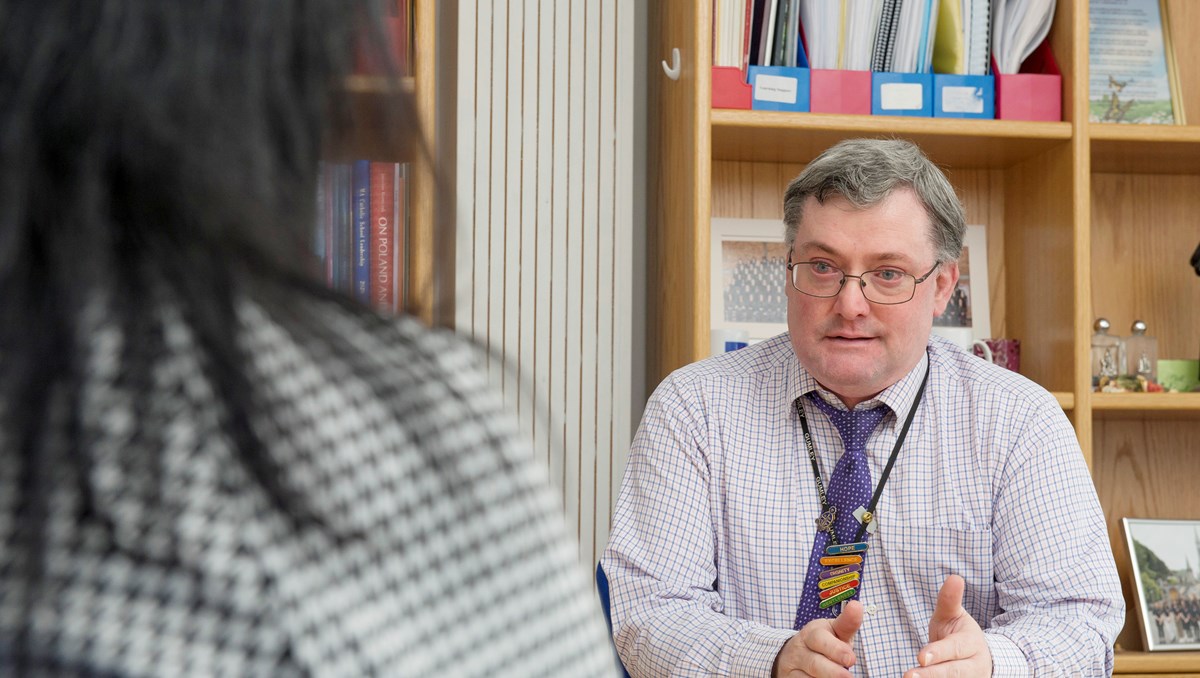How often do you feel guilty?
Lynn How looks what causes us to struggle with feelings of guilt, both at work and at home and offers some tips on how to cope with these feelings.
Articles / 6 mins read

We’ve all had that feeling of guilt creeping up on us when we feel like we cannot juggle everything at once. Something has to give and whatever it is, whether it’s a relationship, your classroom practice or your own children, the perfectionists in us struggle to not complete tasks to the impossibly high standards that we set ourselves.
Guilt is an emotional and psychological state that arises when a person feels responsible for wrongdoing, moral transgression, or harm caused to others. It can manifest in various ways and may differ from person to person.
However, there is still a place for it in our lives. I would consider that the concept of feeling guilty about something loosely falls into two categories:

For example, in the ‘should feel guilty’ category, it is likely that we should feel guilty for situations such as saying something unkind. If for example, you snap at a member of your team who is covering another class due to staff sickness, when they themselves are sick, it is likely that you wouldn’t feel great and guilt would set in. In these situations, guilt is a great reflection aid on which to base our future behaviour. Let’s face it, we’ve all done things we’re not proud of and have decided not to do them again! Our conscience is a powerful thing.
In the ‘shouldn’t feel guilty but do’ category we have the vast majority of the teaching profession. These empathetic and altruistic souls are desperate to do a good job, desperate to please everyone and sometimes forget they are only human. These feelings can be exacerbated by others who use your kind nature against you to guilt trip you into not having a day off when you are ill for example (you will likely come across one of these people at some point in your career).
There is of course the middle ground as well which is a combination of the two types.
If you are suffering from a guilty conscience you may have symptoms such as:
- Emotional distress: guilt often triggers negative emotions such as sadness, shame, or remorse. These emotions may be intense causing inner turmoil.
- Self-blame: individuals experiencing guilt may engage in self-blame, taking full or partial responsibility for the issue.
- Increased anxiety: guilt can lead to an increase in anxiety and worry. The person may ruminate about their actions.
- Physical symptoms: guilt can sometimes have attached physical symptoms such as tiredness, insomnia, loss of appetite etc
- Atonement: guilt may drive individuals to engage in self-punishment. This can manifest as self-criticism or self-sabotage.
- Asking for forgiveness: individuals may seek forgiveness, validation or reassurance.
What drives guilt in education?
There are many factors which in our current educational climate that might cause us to struggle with feelings of guilt, both at work and at home:
- Lack of resources and budgets in schools: with less staff and fewer resources, everyone’s workload increases. You feel like you are letting the side down if you are unwell.
- When you are ill, sometimes it’s less effort to go in: you think that the supply teacher will leave your room as a mess and not mark your books. Your school expects you to send in work for your class anyway (even though you shouldn’t have to provide it). You are made to feel like you are a major inconvenience to your class if you are ill.
- Wellbeing is not at the core of your school: SLT make all the right sort of noises, however, they are still able to guilt trip you into letting the children down if you are sick or overwhelmed by workload (even though high school wellbeing means less workforce sick days overall).
- We are yes people: we take on too much and don’t consider the consequences of trying to please everyone.
- Family time: you don’t do activities with your family because you are exhausted and it’s less stressful overall to make sure all your books are marked.
- School leaders: if you are a leader you feel an overwhelming responsibility for everything and everyone. Your governing body may not help with this.
82%
of senior leaders find it hard to switch off from work-related issues.
A profession under pressure
In a recent report from Education Support, ‘Teaching: the new reality’, various pressures that could add to these feelings of guilt are discussed.
The report states, ‘The idea of a vocation is imbued with notions of service, in this case, service to the needs of children and young people. This can become a problem if the wellbeing needs of teachers and education staff become obscured by their focus on being of service – either by themselves or their organisational culture.’ This notion exacerbates feelings of guilt.
The report also considers that ‘It is not in the current culture of the teaching profession to boundary the service offered. If children have a need, the reflexive response is to respond again and again. This lack of limit, coupled with the relentless demand from our communities can lead to exhaustion.’
82% of senior leaders and 69% of teachers find it hard to switch off from work-related issues.
Here are some examples of what could make you feel guilty whilst working in education:
- You respond to an email at midnight as you didn’t have time during the day and your conscience won’t let you sleep until it is done now that you have remembered.
- You miss your child’s school play as you were unable to get time off of work.
- You cancel date night with your partner due to test marking.
- As a leader you receive an RI OFSTED judgement and consider that you have let the whole school community down.
Top tips for leaders for coping with guilt:
It’s tough at the top! Coping with guilt as a school leader requires self-reflection, a growth mindset, and a commitment to continuous improvement. You may want to consider the following:
- Recognise your impact: focus on positive impact: Remind yourself of the positive impact you have made as a school leader. Reflect on the progress and achievements of your school community, and the support you have provided to teachers and staff.
- Connect with others: develop networks of other heads who you can talk over issues with as well as talking to your governing body.
- Reflect and acknowledge the guilt: take the time to reflect on the source of guilt and acknowledge your feelings.
- Seek perspective: consider the situation from a broader perspective. Recognise that everyone makes mistakes and that teaching is a complex and challenging profession. I’m a huge fan of the ‘circle of concern’ concept (Education Support has an example here). Use this to consider what you can and can’t control to help limit or shrink the size of feelings of guilt.
- Practice self-compassion: treat yourself with kindness and understanding.
- Seek support: reach out to trusted colleagues, mentors, or friends to share your feelings and gain perspective. And don’t forget, Education support offer free emotional support for leaders and education staff 24/7. Call them on 08000 562 561.
- Take responsibility and make amends: if your guilt stems from a specific action or incident, take responsibility for your part and, if appropriate, take steps to rectify the situation. Find out how in ‘The power of vulnerability in leadership.’.
- Engage in self-care activities: which will promote your physical, emotional, and mental well-being. This may include exercise, hobbies, spending time with loved ones, or seeking professional support if needed. Or take a look at these resources covering self-care.
For school leaders to support staff struggling with guilt, they can:
- Encourage open discussion about workload.
- Ensure that school wellbeing is at the core of the organisation.
- Develop flexible working practices to allow staff to attend important events.
- Regularly reflect on unnecessary workload.
- Support staff in putting their guilt into perspective and letting some of it go.
- Role model how to reduce the size of a work-related unnecessary guilty conscience.
- Ensure the psychological safety of all staff (find out more in this guide).
If you are struggling
The reasons for struggling with any guilt you feel in your education setting may be multifaceted. And whether they are linked to the core values of your organisation, pressures from external sources such as getting good results for your school or your own personal perfectionism, it is okay to ask for help. Consider talking to trusted colleagues or friend. And remember, Education Support are always on hand to lend an ear and offer practical advice.
Lynn How is the Editor at Teacher Toolkit. With 20 years of primary teaching and SLT experience, she has been an Assistant Head, Lead Mentor for ITT and SENCO. She loves to write and also has her own SEMH and staff mental health blog. Lynn holds an MA in Education, NASENCO and NPQH. Her particular areas of interest are wellbeing (staff and pupil), SEND, children's mental health, leadership, mentoring and coaching. Recently she has started an Educational Consultancy business for SEND (SEND support) and Teacher Wellbeing (The Wellbeing Lady). You can find her teacher coaching group on Facebook; a group for those wishing to improve their work life balance in school.
Sources
- Definition of guilt – Oxford English dictionary: https://dictionary.cambridge.org/dictionary/english/guilt
- Working with guilt and shame, Cambridge Press: https://www.cambridge.org/core/journals/advances-in-psychiatric-treatment/article/working-with-guilt-and-shame/E274C3EC63EF0191113B049C5F2C86F3
- Why do we feel guilt? By Julie Basset, Volume 5, Psychology Now (printed addition)
Download our top tips infographic
Our service provides emotional and practical support that helps you and your colleagues thrive at work.

Fully funded professional supervision for school and FE college leaders in England and Wales.





















